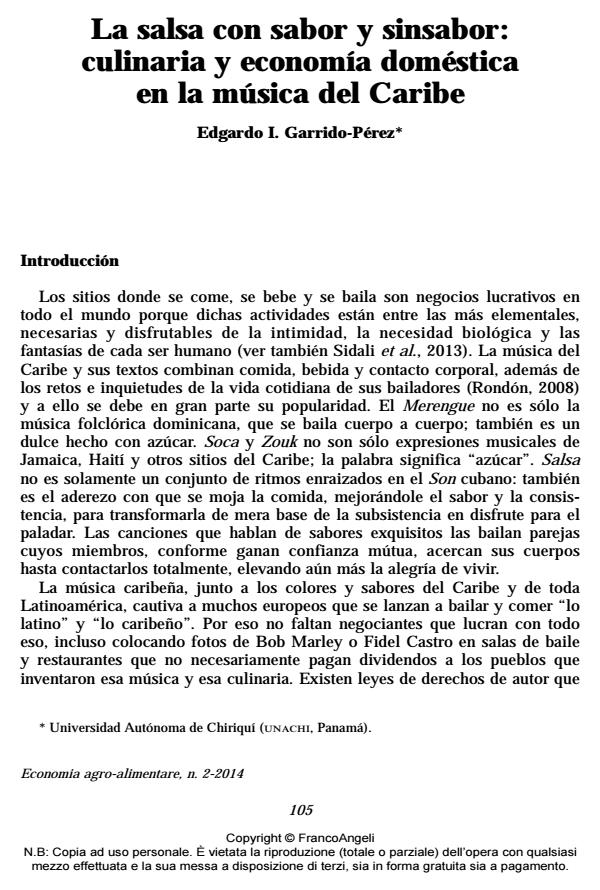La salsa con sabor y sinsabor: culinaria y economía doméstica en la música del Caribe
Titolo Rivista ECONOMIA AGRO-ALIMENTARE
Autori/Curatori Edgardo I. Garrido-Pérez
Anno di pubblicazione 2014 Fascicolo 2014/2
Lingua Spagnolo Numero pagine 17 P. 105-121 Dimensione file 108 KB
DOI 10.3280/ECAG2014-002007
Il DOI è il codice a barre della proprietà intellettuale: per saperne di più
clicca qui
Qui sotto puoi vedere in anteprima la prima pagina di questo articolo.
Se questo articolo ti interessa, lo puoi acquistare (e scaricare in formato pdf) seguendo le facili indicazioni per acquistare il download credit. Acquista Download Credits per scaricare questo Articolo in formato PDF

FrancoAngeli è membro della Publishers International Linking Association, Inc (PILA), associazione indipendente e non profit per facilitare (attraverso i servizi tecnologici implementati da CrossRef.org) l’accesso degli studiosi ai contenuti digitali nelle pubblicazioni professionali e scientifiche.
A great deal of the popularity of Afro-Caribbean music is because the millions of people dancing it associate that music to the joys of aroma, flavor, and body contact. This exploration of the texts of about 1115 songs shows that: (1) there are songs putting food and drinks as the main topic for both celebration and every-day life histories. (2) Other songs talk about snacks and soft drinks while others (3) metaphorically mention food for talking about sex. (4) Some songs about non-food subjects collaterally mention food as part of the wider story. (5) Many singers sing about subjects completely unrelated to food, still using phrases like Azúcar! (sugar), Sabor! (flavor) and Qué rico! (it’s tasty!) as personal trademarks or in order to keep the attention of dancers. (6) Gluttony is usually a joke. (7) Even though drunkenness is portrayed as funny and as a mitigation of love pains there are also singers encouraging people to get out of such alcohol abuse. (8) A subject captivating the attention of most influential artists is how difficult are food production for farmers, navigation for fishermen, and paying the expensive costs of food for city inhabitants. Sponsoring places adequately combining restaurants with dancing halls where cooks and disc-jockeys are born, grown, and educated in the Caribbean seems more effective than the Traditional Specialty Guaranteed tag for ensuring the fair trade of Caribbean food, drinks, and music in Europe.
Parole chiave:Calypso-Cumbia-and Guaracha music, domestic economy, intimacy, Salsa, Traditional Specialty Guaranteed
Jel codes:D12
Edgardo I. Garrido-Pérez, La salsa con sabor y sinsabor: culinaria y economía doméstica en la música del Caribe in "ECONOMIA AGRO-ALIMENTARE" 2/2014, pp 105-121, DOI: 10.3280/ECAG2014-002007